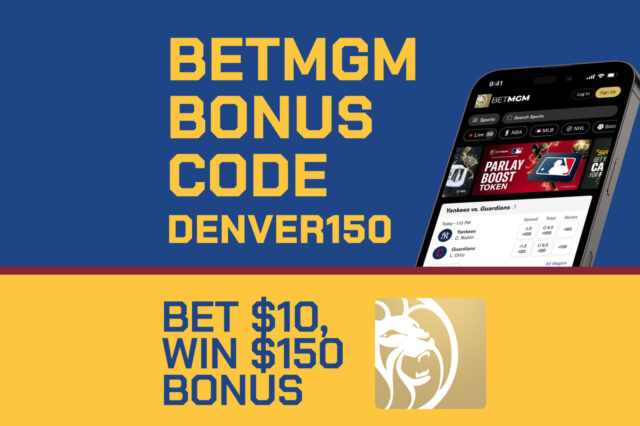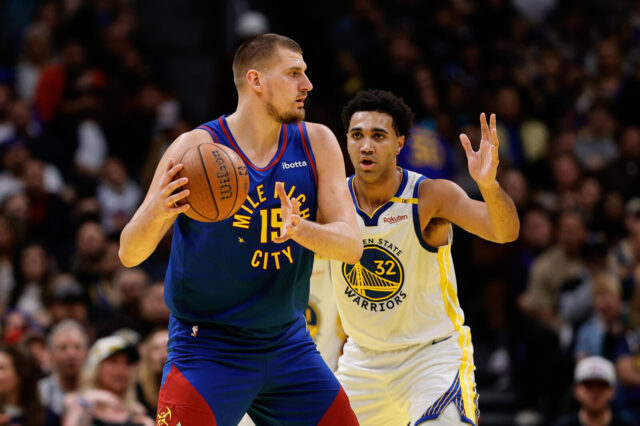The last time I wrote this column was on March 11. That piece was a frank admission that I, like most people up to that point, had not taken COVID seriously enough and that the NBA needed to shut down. Just a few hours later, the Jazz were pulled off the court after Gobert tested positive, and the Nuggets lost their final regular season game prior to entering The Bubble.
That feels like a lifetime ago.
Since then, I’ve suffered multiple family tragedies, been diagnosed with a serious health condition, fought through COVID-related unemployment, and sweated under the hottest summer in Denver’s history. I’ve watched Colorado burn, the country divide, and my love and respect for humanity dwindle. Plus, I put on like 20 or 40 pounds—I have no idea. So much junk has happened to me and many, many others this year that it’s hard to even remember what the world was like prior to that monumental night in mid-March.
And then … AND THEN … the Denver Nuggets—looking every bit as cooked as I’ve been feeling—made an improbable comeback against the Utah Jazz and again against a title favorite and their roster of stars. All is not right in the world, but it sure feels a whole lot better.
This remarkable Nuggets’ run has taught me five lessons that I needed to learn after a year that caught me totally off guard.
You Don’t Lose Until You Quit
You don’t lose because the other team has a lead. You don’t lose because the other team has more talent. You don’t lose because you get thrown down or blocked or bloodied. In other words, you don’t lose because of external circumstances—you only lose when you quit.
Had the Nuggets given up against Utah or LAC, they could’ve found excuses. The Bubble, injuries, youth, bad luck, bad matchup, Kawhi Leonard, 70 days in the same hotel room. Whatever. Jokic and several other players had COVID. Harris didn’t play a game in nearly six months when he was asked to slow down Donovan Mitchell in a playoff series. Barton has yet to play. On and on we could go—and would have—if the Nuggets had gone quietly into the fall, forgetting this Bubble thing ever happened.
But they didn’t.
Battling back the way they did was more important for the growth of this team than simply winning two series would have been. They learned to keep fighting no matter how impossible the situation seems to be. They also learned to control the things in their control and ignore what isn’t.
They’ll remember that when LeBron freight trains down the lane in Game 1. And I’ll remember it as I pick myself off the mat of 2020 and start dusting off.
The Tricky Thing about Expectations
A guy once told me that unmet expectations are the biggest cause of unhappiness and disagreements for most people. It made sense to a much younger man, and it makes more sense the older I get. Contentment is hard to find in a society pushing us to be everything to everyone all the time. Athletes feel it perhaps more than most because of their platform and absurd pay. Kawhi ditched a city that loved him to build his own team at his own pace in the city he wanted to live in. He earned that. But along with those choices came the expectation that he would deliver a championship to a team long bereft of success.
The Clippers showed the crushing weight of those expectations after Denver hit back in Game 5. That collapse—while predictable—was perhaps the biggest choke job in NBA history. As the pressure mounted with each successive setback, the shots got shorter, the passes wilder. When Paul George chucked a three off the side of the backboard as the last thread unraveled on the Clippers’ season, the distinction between the teams was obvious: one team didn’t want to lose—the other team wanted to win.
After the game, the Clippers couldn’t agree whether this season had been deemed a “Championship or bust.” But with only one more year of Kawhi and PG gauranteed, it’s hard imagine they were always in this for the long haul. Had the Clippers had more reasonable expectations, perhaps the series would’ve gone differently. Some players seem unaffected by that kind of pressure. LeBron James has lived up to exceedingly high expectations his entire life. But not everyone is LeBron James—not even, apparently, Kawhi Leonard or Paul George.
Team Trumps Talent
On Woj’s podcast this week, Tim Connelly repeatedly talked about building relationships within the organization and with his players. He admitted that he probably should’ve been fired after his first couple years, but that the Kroenkes stuck with him probably “because they liked [him].” He, in turn, has surrounded himself with guys he likes, both in the front office and on the team—guys like Nikola Jokic and Jamal Murray, who are, according to Connelly, “laid back” and “low maintenance.”
Going into the second round, the Clippers had the better team on paper. Denver only had a clear advantage at one position. L.A. also had a championship coach, a deep bench boasting not one but two Six Man of the Year winners. Many pundits considered Kawhi to be the best two-way player in basketball—if not the best player outright. Some would even have taken Paul George over anyone on the Nuggets. They were built to win a championship this year. So why did the big bad Clippers lose?
The answer probably includes the “Championship-or-bust” expectations as well as simple matchup problems and bad luck. But it’s hard to watch the way the Clippers folded in the fourth quarter of Game 7 to a less talented and experienced team and not put a lot of weight on the value of team chemistry. The Nuggets and Connelly set out to build a culture of winning the right way, which takes time and a lot of failure. But if you end up with a true team and not just talent, the effort obviously pays off.
Success Is Much Sweeter When It’s Earned
By all accounts, the Clippers should’ve won this series with two superstars they didn’t draft or develop. By all accounts, the Lakers should win the Western Conference Finals and advance, again, this time with LeBron James and Anthony Davis – players who maneuvered things to get to L.A., largely for non-basketball reasons. If the Clippers had closed out the Nuggets or if the Lakers win, their fans will feel themselves. They will wear their jerseys to the beach and post memes on my timeline. But deep down, fans of these fabricated teams know there is something empty about winning with mercenaries, which is why so many of them are dispassionate, fair weather casuals who float in and out based on the team’s record.
But deep down, fans of these fabricated teams know there is something empty about winning with mercenaries, which is why so many of them are dispassionate, fair weather casuals who float in and out based on the team’s record.
When Jamal Murray and Nikola Jokic hugged at the end of Game 7, it was an earned moment. In that hug was a heartbreaking Game 7 loss to Portland last year; the sting of missing out on the playoffs in overtime two years ago against the Timberwolves; the Spurs getting out to a quick lead in a tough inaugural playoff run; the exhilaration of having come back from 3-1, again, which no team in NBA history has ever done.
The LAs, on the other hand, have very little shared experiences. They are teams stacked with roaming guns for hire who believe their individual talents are enough to overcome their lack of cohesion. And in the end, they may be right. But in an era defined by individualism, entitlement, and opportunism, I can’t help but believe the Nuggets’ “resilience,” their “toughness,” their “fight” comes from the fact that they have built this team the right way. Coach Malone rewards energy and work ethic even when it comes from less skilled players, and the team has taken on that same unselfish, process-oriented mentality. All of this shared effort builds chemistry—a buzzword everyone talks about but few teams truly achieve.
If we learned nothing else from the last two series, we need to learn this: our Denver Nuggets have chemistry, and it was forged under Connelly’s direction, in Coach Malone’s practices, and in the years of growing and grinding that has gotten this team into contention. If the Lakers have enough talent to overwhelm that chemistry—if LeBron James goes alien and no mere mortal on the Nuggets is enough—so be it. But I promise there is not a Lakers’ fan in the world who will be prouder or more satisfied than the Nuggets fans who have seen this process through.
Sports Are Important
Sports are not as important as human life. Not by a mile. No need for normalcy, routine, or escape ever outweighs the importance of protecting people’s health and safety. Full stop. Without life, we have nothing. And if we don’t individually do our part to ensure the safety of our community, then everyone suffers and lives are damaged or lost.
But sports are important.
They are one of the few things left in this decaying society that unites people regardless of race, gender, ethnicity, social status, wealth, or any of the dozens of other ways we insist on dividing ourselves all the while giving us a distraction from those very things.
If, for just a few weeks or a month, the Denver Nuggets helped me and the people in my community in Englewood and the greater metro area remember that we can find common purpose, that we can smile together and cheer together and celebrate together, then that means something. It’s not going to fix the world or destroy COVID or pass legislation, but it can make you forget those realities for a time so you can laugh and cheer and cry along with people who don’t necessarily think like you or look like you—or, heck, even like you.
So as we all watch the Western Conference Finals together, think for a second about how much worse things could be …
You could be a Lakers fan.


